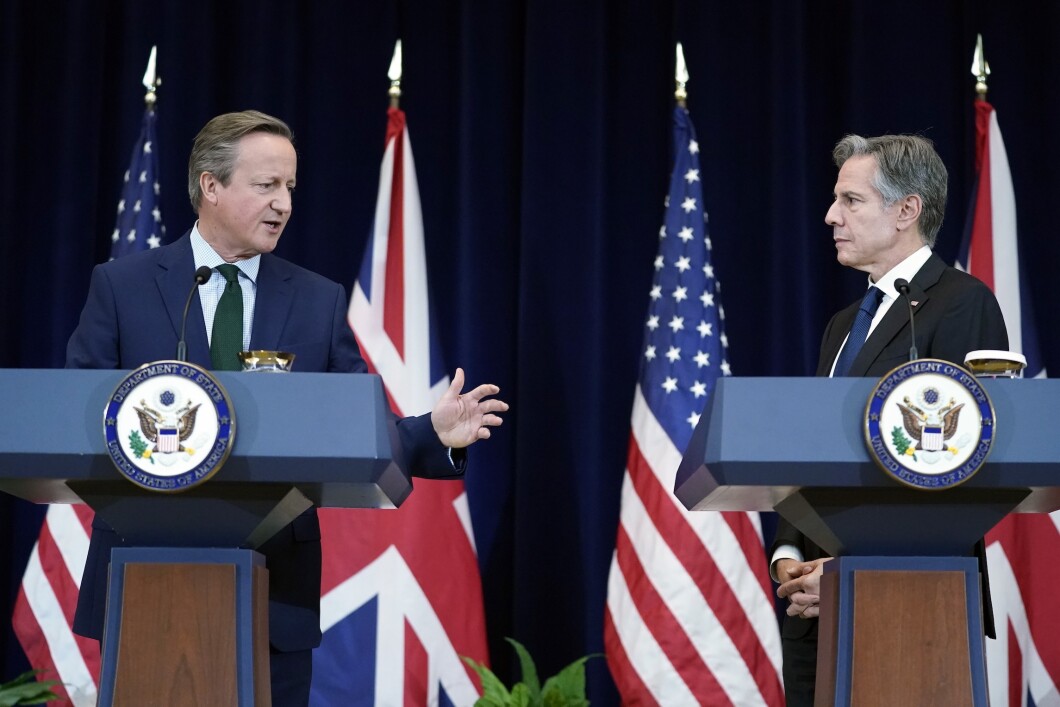
U.S. lawmakers should agree to a funding bill for aid to Ukraine or risk making a mistake comparable to the British act of appeasement that empowered Adolf Hitler before World War II, according to the United Kingdom’s top diplomat.
“You know, in the 1930s, we didn’t act fast enough to deal with the evil dictator who was invading European countries and redrawing borders by force, and we know how that ended,” British Foreign Secretary David Cameron told reporters Thursday at the State Department. “And I think strength through deterrence, and helping your allies, and stopping this appalling invasion is absolutely essential.”
HOME ECONOMICS: THE ALTERNATIVE TO MORTGAGES WITH SKY-HIGH RATES
Cameron has delivered that warning to policymakers and politicians throughout Washington, D.C., during his first return to the city as a Cabinet official since the end of his six years as prime minister in 2016. That message was the latest in an urgent round of appeals from British and Ukrainian officials who hope to tip the balance in a congressional standoff over supplemental funding for Ukraine before the previously approved funding runs out.
“This is the reason I wanted to be in Washington, D.C., this week, was to make the point about how important it is that we go on funding Ukraine and helping Ukraine in every way we can to resist Putin’s illegal invasion,” Cameron said. “I see it as the challenge of our generation. Just as my grandfather’s generation had to fight off Nazi aggression in Europe. We are fighting against Russian aggression in Europe.”

The political dispute about whether and how to continue aiding Kyiv has erupted as the war in Ukraine has settled into a “stalemate” on land, Ukraine’s top general acknowledged in a recent media interview. Yet Cameron countered that Western powers should not lose sight of Ukraine’s military successes, especially their punishing strikes on Russia’s Black Sea fleet in Crimea, which forced Russia to withdraw key vessels beyond the range of Ukrainian missiles — an achievement, he suggested earlier Thursday, that showcases a potential path to victory for Ukraine.
“If we are able to give Ukraine more of the long-range missiles that the U.K. has been giving — and the U.S. has too,” he said during an Aspen Security event in Washington. “There is nothing that will drive Russia further back, and put Putin more on the back foot, than actually seeing that Crimea, which is legally part of Ukraine, is properly under attack from Ukrainian forces.”
Although Cameron gave a nod to Biden’s recent approval of a shipment of long-range Army Tactical Missile Systems for Ukraine, that statement set the stage for a thinly veiled critique of the administration. Biden reportedly has sent less than two dozen of the ATACMS, chosen in recent months from the stockpile of the oldest and shortest-ranged variant of the missile. And Biden’s team reportedly worries that Putin would treat any serious threat to his control of Crimea, the strategically vital Ukrainian peninsula where the war began in 2014, as a “red line,” which the United States hesitates to cross.
“It shouldn’t be seen as a red line militarily at all; it is part of Ukraine,” Cameron told the Aspen audience. “As long as you don’t cross the red line of NATO soldiers fighting Russian soldiers, we should be doing everything we can to support a sovereign independent nation to defend itself. … I think sometimes there’s been a bit of hesitancy over escalatory threats, which, actually, experience hasn’t borne out.”
Any disagreement about the wisdom of providing one system or another could be rendered moot by the stalemate in Congress. Biden hoped to overcome Republican aversion to aid for Ukraine by linking that $61 billion funding request with additional aid for Israel, among other things, including border security. Republicans have their own specific priorities for the border-related provisions, which Biden has not yet accepted.
“Dems want $106B—GOP wants a closed border. That’s the trade,” retiring Sen. Mitt Romney (R-UT) wrote on social media this week. “But clueless Dems want to negotiate the border bill. Not going to happen. Is an open border more important to Dems than Ukraine and Israel?”
CLICK HERE TO READ MORE FROM THE WASHINGTON EXAMINER
The Ukraine bill will pass before it’s too late, Cameron predicted, adding that it would galvanize additional European aid for Ukraine as well.
“I’m not an expert on your political system, but, in Congress, there is a majority for supporting Ukraine,” he told reporters Thursday. “I’m sure that goodwill will prevail and the money will be voted through. And it will have a huge effect, not just on morale in Ukraine, but also making sure that European countries keep asking themselves what more can they do.”




